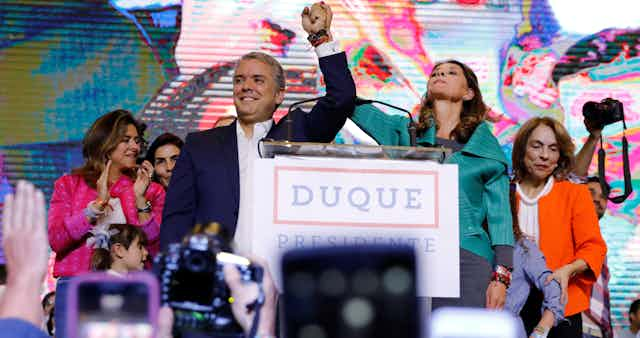In the most peaceful election in its modern history, Colombia has elected as its next president a conservative who has promised to “correct” the country’s tenuous 2016 peace deal.
Iván Duque, of the Democratic Center party, won election on June 17 with 54 percent of the votes amid record high turnout. Duque opposes same-sex marriage, supports harsh penalties for drug use and wants to reduce taxes on the wealthy.
His left-wing rival, Gustavo Petro – a one-time Marxist guerrilla fighter and former Bogota mayor – received 42 percent of the vote.
Approximately 5 percent of Colombians cast blank ballots, showing their dissatisfaction with the two candidates who advanced from the first round of Colombia’s presidential election in May.
The 41-year-old Duque, who has never before held elected office, begins his four-year term in August. His running mate, Martha Lucía Ramírez, will become Colombia’s first female vice president.
What of peace?
Duque’s win was widely predicted in this conservative South American country.
But his opponent did far better than expected, almost doubling his share of the votes between the first and second rounds of the election. He received 8 million votes, more than any leftist presidential candidate in Colombia’s history.
Beyond appealing to progressive Colombians, Petro also attracted moderates who feared Duque’s opposition to a 2016 peace accord between the Colombian government and the Armed Revolutionary Forces of Colombia, or FARC guerrillas.

As part of the deal, which ended 52 years of violence in Colombia, FARC combatants would avoid jail time for their wartime crimes if they agreed to lay down their weapons and undergo training for their re-entry into civilian life.
FARC members were also allowed to participate in Colombia’s political process. The FARC relaunched as a political party in August 2017, and its former commander briefly ran for president this year before withdrawing for health reasons.
Echoing the hawkish rhetoric of his mentor, the powerful Senator and former President Alvaro Uribe, Duque says the 2016 FARC accord was too lenient and should be “renegotiated.” The president-elect wants former combatants to be punished for their crimes.
Duque was the only candidate in Colombia’s 2018 presidential election who did not support the ambitious agreements ending war with the FARC. Reneging on the deal risks restarting the longest-running conflict in the Western Hemisphere.
Colombia is currently in talks with a different armed group, the National Liberation Army. The group, which is now Colombia’s largest guerrilla organization, has kept a ceasefire in place and signaled its intention to stay at the negotiation table. But the status of that peace process is now unclear.
Tackling the drug trade
Also on Duque’s chopping block is the peace accord’s plan for dealing with drug trafficking and the cultivation of coca leaf, the main ingredient in cocaine.
The drug trade remains a central challenge to Colombia’s peace process. Revenue from illegal coca and cocaine fueled Colombia’s armed conflict for the last three decades. In April 2018, the U.S. accused FARC leader Jesús Santrich of international drug trafficking.
Suggesting that the FARC’s connections to the drug trade inappropriately influenced the peace deal, the president-elect has said he will reconsider its drug-related provisions. They include programs that help farmers replace their illicit crop with legal products like coffee or cacao.
Duque wants to resume aerial fumigation, a U.S.-supported counter-narcotics strategy to eradicate coca crops. It was ended in 2015, decades after evidence emerged that the glysophate spray was poisoning Colombian farmers and killing legitimate agricultural products.
Advocates of Colombia’s peace deal and drug policy reformers say such punitive approaches merely hurt poor farmers while fueling the kind of rural anti-government sentiment that bolsters support for armed factions.
Birds of a feather?
The president-elect may not follow through on all these campaign promises.
Colombia’s peace deal with the FARC was divisive. Just over 50 percent of the population voted against it in an October 2016 referendum, compelling President Juan Manuel Santos to pass his hard-won accord through congressional action instead. So running against the peace process was a good campaign strategy for an opposition candidate.
But Duque moved toward the center in the lead-up to the presidential run-off to win over moderate voters, and he has promised not to “tear the agreement to shreds.”
As president, he may prove better able than the current president to sell conservative constituents on some concessions that are necessary to keep Colombia’s peace.

His decision on the peace process and many other pressing issues in Colombia will likely depend on the role that the hard-line former President Uribe plays in his administration. Uribe – now a senator and the leader of a deeply right-wing legislative bloc backed by evangelical Christian groups – was an outsized presence in Duque’s campaign.
Polls show that many Petro voters voted against Duque because they feared that the controversial Uribe would run his presidency behind the scenes.
The specter of corruption
Duque’s campaign was also endorsed by several politicians with alleged connections to violent Colombian paramilitary organizations. That has fueled concern that the powerful illicit groups will once again exert influence over Colombian politics at the highest level.
Duque, however, says fighting corruption will be a centerpiece of his presidency.
“We will be the government that … confront[s] this cancer,” he said in his acceptance speech, adding that Colombia should be a “country of social justice and political equality.”
For the millions of Colombians who voted against him, the future of this war-torn nation feels uncertain. Duque must now decide whether to govern Colombia in peace.

